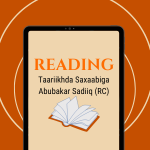The Biography of Prophet Muhammad (Peace Be Upon Him)
The Biography of Prophet Muhammad (Peace Be Upon Him)
Prophet Muhammad ibn Abdullah ibn Abdul-Muttalib (PBUH) was the final Messenger of Allah, born into the noble Quraysh tribe of Makkah. He was born in the Year of the Elephant (570 CE), the year when Abraha attempted to destroy the Kaaba. His father, Abdullah, passed away before his birth, and his mother Amina bint Wahab died when he was only six years old. Thus, he grew up as an orphan, first under the care of his grandfather Abdul-Muttalib and later under his uncle Abu Talib.
Childhood
During his childhood, the Prophet (PBUH) was known for his honesty, truthfulness, and excellent character. As a young boy, he worked to support himself, first as a shepherd and later as a trader. Those who dealt with him admired his integrity, giving him the nickname Al-Amin (the trustworthy), for he never lied nor deceived anyone.
Marriage
At the age of 25, Muhammad (PBUH) married Khadijah bint Khuwaylid, a respected and wealthy merchant woman of Makkah. She was impressed by his honesty and noble manners. Their marriage was blessed, filled with mutual respect and love, and from it came several children, including Fatimah al-Zahra.
The Beginning of Revelation
Even before prophethood, the Prophet (PBUH) disliked idolatry and the corrupt practices of the Quraysh. He often withdrew to reflect and worship Allah alone, spending nights in the Cave of Hira on Mount Noor.
At the age of 40, he received the first revelation. Angel Jibreel (Gabriel, peace be upon him) appeared to him and said, “Read!” The Prophet replied that he could not read, but after Jibreel repeated the command, he recited the first verses of Surah Al-‘Alaq. This moment marked the beginning of his mission as a Messenger of Allah.
The Call to Islam
At first, Prophet Muhammad (PBUH) invited his close family and friends to Islam. The earliest Muslims included Khadijah, Abu Bakr, Ali ibn Abi Talib, and Zayd ibn Harithah. For three years, he preached secretly until Allah commanded him to call people openly. He then stood in Makkah and proclaimed the oneness of Allah and the rejection of idol worship.
Persecution and Hardship
The Quraysh fiercely opposed his message. Early Muslims were tortured, persecuted, and boycotted for their faith. Some fled to Abyssinia (modern-day Ethiopia), where the Christian king, the Negus, granted them refuge. Despite the hardships, the Prophet (PBUH) and his companions showed patience and perseverance.
Eventually, Allah opened the door for migration (Hijrah) to Madinah. This historic migration in 622 CE marked the beginning of the Islamic calendar.
Life in Madinah
In Madinah, the Prophet (PBUH) established the first mosque and created a strong community based on justice, brotherhood, and faith. He united the emigrants (Muhajirun) and the helpers (Ansar), and he signed agreements with Jews and other tribes to ensure peaceful coexistence.
During this period, several battles were fought against Quraysh and other enemies of Islam, including Badr, Uhud, and the Battle of the Trench. Although Muslims faced hardships, Islam continued to spread. The Treaty of Hudaybiyyah later gave Muslims the opportunity to spread Islam peacefully across Arabia.
The Conquest of Makkah
In the 8th year of Hijrah, the Prophet (PBUH) and his followers peacefully entered Makkah with little resistance. Instead of seeking revenge, he forgave his enemies, declaring: “No blame shall be upon you today. You are all free.” His mercy and forgiveness won the hearts of many, leading to a large number of people accepting Islam.
The Farewell Pilgrimage
In the 10th year of Hijrah, the Prophet (PBUH) performed his first and last pilgrimage, known as Hajj al-Wada (The Farewell Pilgrimage). During this journey, he delivered a historic sermon emphasizing justice, equality, the sanctity of life, and adherence to the Qur’an and Sunnah. He reminded Muslims that they were all equal, regardless of race or status, and that their true worth was based on piety.
Passing Away
A few months after his farewell pilgrimage, the Prophet (PBUH) fell ill in Madinah. On the 12th of Rabi‘ al-Awwal, at the age of 63, he passed away peacefully. He was buried in the chamber of his home beside Masjid al-Nabawi. His death was a great sorrow to his companions, yet his message of Islam continued to flourish across the world.
Conclusion
Prophet Muhammad (PBUH) was the final Messenger of Allah, sent as a mercy to all mankind. His life was a perfect example of honesty, patience, humility, and compassion. Through his leadership, character, and teachings, Islam spread rapidly and remains one of the world’s major religions today. His legacy continues to inspire billions, guiding humanity with light, justice, and mercy.

